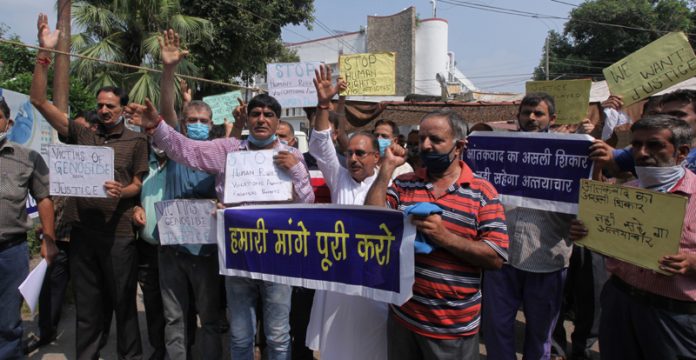On September 18, hundreds of Kashmiri Pandits held a protest demonstration at Jagti township in the outskirts of Jammu city against the delay in the payment of monthly relief. Stating that the delay in repayment of relief to the migrant community has happened for the first time in the last three decades, the aggrieved community questioned the government of India’s plans to rehabilitate them – especially after tall promises made by BJP post abrogation of Article 370.
Auqib Javeed | TwoCircles.net
JAMMU – “We will die if the government won’t release our monthly relief package,” said forty-eight-year old Shanta Lal, a migrant Kashmiri Pandit while holding a protest demonstration in Jammu – the winter capital of Jammu and Kashmir.
Kashmiri Pandits, a tiny minority of the erstwhile state of Jammu and Kashmir, migrated to Jammu from different parts of Kashmir following the eruption of armed insurgency in Kashmir valley in the late eighties.
While many Kashmiri Pandit families settled in different parts of India, a significant number of them, however, are residing in a separate colony known as Jagti camp on the outskirts of Jammu city.
On September 18, hundreds of Kashmiri Pandits held a protest demonstration at Jagti township against the delay in the payment of monthly relief.
Kashmiri Pandits get a monthly relief of Rs 13,000 under the Government of India’s relief package. However, over 22,000 families have been without ration for the last two months due to a dispute between a contractor and the Jammu and Kashmir Relief Department.
The aggrieved Kashmiri Pandit migrants said that the Bharatiya Janata Party (BJP) led government made several promises to the members of the Kashmiri Pandit community till August 5, 2019 — when the Centre announced its decision to scrap J&K’s special status and bifurcated it into two union territories — but not many promises were fulfilled.
The protesters threatened to intensify their agitation if their monthly relief was not immediately released.
“The relief for the month of August was not released by the Relief Organisation till date, causing hardships to the displaced community,” a spokesman of the Kashmiri Pandit Relief Holders Association told reporters.
He said the delay in the release of monthly relief was seen for the first time in the past three decades.
“We appeal to Lt Governor Manoj Sinha to look into the issue and ensure early release of the payment,” the spokesman said.
Earlier, the protesters including men and women with banners and black flags in their hands tried to march towards the National Highway to register their protest against what they called the callousness of the Government in releasing the relief for the month of August.
Shouting slogans in support of their demand, they alleged that the Relief Organisation and the Government had unnecessarily created the problem of holding thousands of relief holders to ransom.
Benefits for migrant Kashmiri Pandit post abrogation of Article 370
Pertinently, post August 5, 2019, the government of India claimed that they took many steps to facilitate the homecoming of Kashmiri Pandits. In March this year, Minister of State for Home Affairs, G. Kishan Reddy informed Parliament about the detailed plan of the government to resettle Kashmiri Pandits in the Valley.
Reddy while quoting the report of the Relief Office setup in 1990 by the Government of Jammu and Kashmir stated that 44,167 Kashmiri Pandit migrant families are registered who had to move from the Valley since 1990 due to security concerns. Out of these, the count of registered Hindu migrant families is 39,782.
The minister informed that special jobs for Kashmiri migrant youth under the Prime Ministers’ package have been an important component for the rehabilitation of Kashmiri Pandits.
A total of nearly 3,800 migrant candidates have returned to Kashmir in the last few years to take up the PM package jobs.
Post abrogation of Article 370, as many as 520 migrant candidates returned to Kashmir to take up the jobs that were provided to them under the rehabilitation package.
The administration has already approved the construction of transit accommodation for Kashmiri migrant employees at six locations in the Valley under the Prime Minister’s development package for the community. The estimated cost of the project is Rs 201.60 crore, the government said.
The locations include Marhama-Bijbehara in Anantnag district, Wandhama-Lar in Ganderbal district, Fatehpora in Baramulla district, Allowpora-Keegam in Shopian district, Odina-Sumbal in Bandipora district and Khullangam Bagh in Kupwara district.
On Friday (September 17), Union Minister Sarbananda Sonowal said that the rehabilitation of Kashmiri Pandits was the core concern of Prime Minister Narendra Modi led government at the centre.
Sonowal, who visited Baramulla as part of the Union Government’s special public outreach programme, also laid the foundation stone of a transit camp that will be constructed for the accommodation of 336 migrant Kashmiri Pandit families at a cost of Rs 40 crore as part of efforts to rehabilitate them in the Kashmir Valley.
In north Kashmir’s Handwara, the administration is all set to axe over 50 fruit-bearing walnut trees in Handwara to pave the way for the construction of a transit camp for the rehabilitation of Kashmir Pandits.
The various developmental projects have failed to impress the migrant Kashmir Pandit and they are “unlikely to return to Kashmir.”
“The conditions of the migrants is quite miserable. Even after 30 years of exile, they are begging for meals. Who will they go back to Kashmir and how will they earn?” another migrant Kashmiri pandit Rattan Lal told TwoCircles.net.
He added that the migrants are not in a position even to arrange the life-saving drugs for their ailing family members and termed the non-payment of relief as a “human rights violation” against them.


